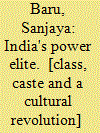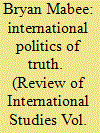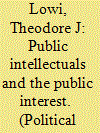|
|
|
Sort Order |
|
|
|
Items / Page
|
|
|
|
|
|
|
| Srl | Item |
| 1 |
ID:
178223


|
|
|
|
|
| Publication |
Gurgaon, Penguin Random House India Pvt Ltd, 2021.
|
| Description |
xvii, 243p.hbk
|
| Standard Number |
9780670092444
|
|
|
|
|
|
|
|
|
|
|
|
Copies: C:1/I:0,R:0,Q:0
Circulation
| Accession# | Call# | Current Location | Status | Policy | Location |
| 060007 | 305.5/BAR 060007 | Main | On Shelf | General | |
|
|
|
|
| 2 |
ID:
187036


|
|
|
|
|
| Summary/Abstract |
C. Wright Mills's critical work on international relations is well known, but is often dismissed as being unscholarly, reductionist, and overly polemical. However, seeing the work in the context of his earlier career can allow for a new perspective, with Mills's activist views on war and militarism shaped very clearly by his earlier theoretical and political commitments. Mills developed a distinctive political sociological understanding of international politics, theorising the state as a historically-situated structural determinant of international power: a network of elite power that was contextualised by the influence of the socially constructed realities of the international created by elites. Mills's crucial critical contribution was to see the role of the intellectual as criticising these realities through the imaginative reconceptualisation of the world, which he called the ‘politics of truth’. The article argues the international politics of truth was not only Mills's distinctive theory of the international, but that it was clearly supported by his early theorisation of the international. A revised view of the importance of Mills's international relations work can help to situate Mills as part of a broader tradition of IR scholarship, a lost lineage of the critical historical and political sociology of the international.
|
|
|
|
|
|
|
|
|
|
|
|
|
|
|
|
| 3 |
ID:
158265


|
|
|
|
|
| Summary/Abstract |
The papers in this research dialogue section are the product of a project that examines intellectual life in China since the 1990s – chiefly the efforts by academic public intellectuals to rethink China’s past, present, and future in light of the excesses of Mao’s revolution, the challenges emerging from reform, and the rise of China to the status of world economic power. Chinese scholars, having benefited from China’s openness to the world and the relative relaxation of political pressure in China (until recently), have much to say about China and the world that merits our attention. Through creative collaboration between Chinese and international scholars, the articles collected here explore that intellectual public sphere since the late 1990s. The articles were written in Chinese by young PRC scholars and rendered into English through ‘collaborative translation’ teams that pair these Chinese with non-Chinese scholars based in Canadian universities. The net result, grounded on repeated conversations and revisions, is not a simple translation but a co-production of knowledge about China that aims to capture the discourse of Chinese scholarship in a way to make it meaningful to anglophone readers. The articles themselves are not traditional surveys of academic scholarship. Rather they map significant areas of an intellectual world and the arguments within it. Three widely accepted intellectual streams of thought (sichao 思潮) organize these soundings: liberals, New Left, and New Confucian. These reports explore connections between and diversity within and beyond each.
|
|
|
|
|
|
|
|
|
|
|
|
|
|
|
|
| 4 |
ID:
100785


|
|
|
|
|
| Publication |
2010.
|
| Summary/Abstract |
Upon my first reading of the Etzioni autobiography, I recalled my favorite book review, written by a nine-year-old, who also should have won a prize for the youngest author and the shortest review ever: "This book told me more about penguins than I wanted to know.
|
|
|
|
|
|
|
|
|
|
|
|
|
|
|
|
| 5 |
ID:
166635


|
|
|
|
|
| Summary/Abstract |
Kerala modernity and its widely acclaimed model of development, among other factors, is a result of radicalised civil society and protracted political action. The political actions of multiple actors such as social reform movements, communist movements, public theatre, people’s science movements, library and radical public policy played decisive role in this direction. In contrast to the two dominant conceptions of modernity – western capitalist modernity and eastern socialist modernity, which conceptualised that modernity is the result of industrialisation and centralised planning and development, respectively – modernity in Kerala was the result of political actions from below, which forced the state to adopt radical social and political reforms. These exceptionalities in Kerala modernity distinct itself from rest of the modernities in societies of the Global South.
|
|
|
|
|
|
|
|
|
|
|
|
|
|
|
|
| 6 |
ID:
072719


|
|
|
|
|
| Publication |
2006.
|
| Summary/Abstract |
This article takes recent theoretical essays by Shanghai scholar and public intellectual, Xu Jilin, and other scholars of the history of thought and culture (sixiang wenhua shi) as a case study of efforts by intellectuals in the People's Republic of China to define and promote a role as public intellectuals separate from the party-state. This analysis suggests that political liberalism is used in such intellectual discourse to explain the social experience of intellectuals in China today and to promote a renewed public role for them. This public intellectual discourse is characterized by the continued privileging of sixiang (thought), by the naturalizing of foreign theories about liberalism, and by the use of such thought work to argue for a renewed public role for intellectuals as interpreters of public issues rather than as legislators of public values.
|
|
|
|
|
|
|
|
|
|
|
|
|
|
|
|
|
|
|
|
|